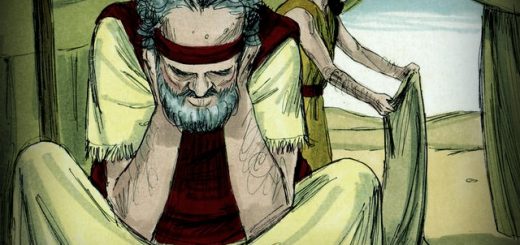Days of Future Prophesied
We have come to the conclusion of the Jacob story, and indeed, of the Genesis story. This is the first time we see a patriarch gathering all his children and blessing them together (unlike Isaac, where it had been quite shadily done behind other people’s backs).
As we did during the sermon, let’s briefly go through each of the blessings:
Leah’s sons:
Reuben – Jacob starts with a blessing, but it turns into an “anti-blessing”, because of Reuben’s sleeping with Jacob’s concubine. Bad move, Reuben. You could have gotten a firstborn blessing, but your instability would harm the family if you took the lead. Indeed, no prophet, judge, priest or king will arise from his tribe.
Simeon – Violent and rash in anger (exemplified in the Shechem massacre, Gen. 34), his tribe ends up as a small group whose territory is enclosed by the larger tribe of Judah.
Levi – Complicit with his brother Simeon in the Shechem incident, Levi’s kin will redeem themselves later when they zealously defend the name of the Lord (Ex. 32:25-29 and Num. 25:7-14).
Judah – His past misdeeds have been overlooked, as he has changed – He has shown his willingness to offer himself as a slave in exchange for Benjamin, out of concern for his father (Gen. 44:18-34). So now Judah receives a bumper crop of blessing: kingship and a ridiculous image of prosperity (imagine being able to wash your clothes in wine). His tribe will rise up as leaders in the nation of Israel.
Zebulun – He is Leah’s sixth son, and yet gets mentioned ahead of Issachar (number five). Is this a sign of gracious preference?
Issachar – While presented as the last of Leah’s sons, he will be laborious and hardy (like a donkey).
Bilhah’s son:
Dan – He will be a judge who will strike back. Probably the most famous (or infamous) descendant of Dan is the judge Samson. Well said then, Jacob.
Zilpah’s sons:
Gad – He will be oppressed like a troubled youngster, but he will strike back at his enemies (in time to come they will be the Ammonites, Moabites, Arameans and Assyrians).
Asher – His name means ‘happy’, and he will abound in culinary delights. Indeed he later inherits fertile land in Canaan.
Bilhah’s son:
Naphtali – Free and fleeting like a deer. A picture of favour (see also Deut. 33:23).
Rachel’s sons:
Joseph – Next to Judah, Joseph gets a very long blessing. Jacob really waxes lyrical in heaping words of prosperity on his favoured son. This goes beyond human favouritism, for notice how Jacob acknowledges God’s own hand of favour upon this son. We have seen how Joseph’s life story bears that out.
Benjamin – The predator. True enough, the Benjaminites will later prove themselves valiant in war.
These blessings portend times of prosperity for Israel’s descendants, but also trouble. That will truly be the story of Israel in time to come – and so blind old Jacob has gained a measure of extraordinary insight at the end of his life.
The blessings pronounced are not independent of the actions of Jacob’s sons. What happens with Reuben, Simeon, Levi, Judah and Joseph are particularly poignant. The children will live in the shadow of what their fathers have done, in some kind of corporate solidarity.
That’s also the case with us, isn’t it? Ever since our first parents Adam and Eve fell, we have all been afflicted by the curse (the first anti-blessing). But in that anti-blessing there lay hidden the seeds of a greater blessing – the saviour king from the tribe of Judah (Gen. 49:10). And so, now, after what Jesus Christ has done, we live in the glorious light of Christ’s blessing, in corporate solidarity with Him by faith.
Perhaps blind old Jacob caught a glimpse of that. He has sensed that his children will in the future be in much distress. But he has (finally) come to know where real help comes from. So he cries out in prayer at the high point of his address:
I wait for your salvation, O Lord. (Gen. 49:18)
This may be the surest sign that, after all his years of grasping and conniving, Jacob has finally learned to see – the saving grace of his Shepherd.
Ng Zhi-Wen









